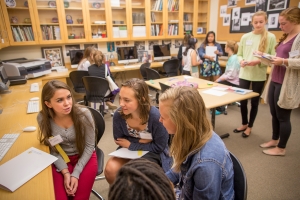On a brisk Tuesday evening in October, Malala Yousafzai received the Liberty Medal at the National Constitution Center, and I was lucky enough to be in the audience, soaking in all of her grace, conviction, and passion. The event featured a series of moving and impressive speakers, including Amy Gutman, the president of the University of Pennsylvania; Michael Nutter, Philadelphia mayor; and Minnijean Brown Trickey, a member of the “Little Rock Nine.” But, naturally, the main event was the girl whom the ceremony was hosted to honor, the girl who, at the age of seventeen, has become an international icon for liberty and justice.
Amidst all of her fame and legend, it’s easy to forget that Malala is just a teenage girl. Yet, at the ceremony, I was reminded of our common ground in the most tiny and endearing of ways. When she was introduced at the beginning of the event, Malala thought it was her turn to speak and started walking over to the microphone, only to hurry back to her seat upon realizing her mistake. It was a small slip-up, negligible to most members of the audience, but to me, the moment was incredibly valuable. It was clear that Malala is not yet accustomed to all of the attention she receives but is rather just a teenager, unsure like any other. All the more, she went on to say (when it was her turn to speak) that she had homework due when she accepted the Nobel Peace Prize. Even in the face of a great honor such as her Nobel Prize, Malala’s homework was still a priority to her. To me, it’s this very groundedness and humility that makes her such a compelling icon for education and women’s rights.
During the ceremony, clips of Agnes Irwin classrooms and students flashed across the screen, presented as the ideal of girls’ education. It was a pleasant surprise, but it also made me realize the stark contrast of my own fortune with those of girls struggling for their fundamental right of education. The experience prompted in me a pertinent shift of perspective: How dare I feel burdened by school and homework when I’m lucky enough not only to attend school, but also to attend one where the quality of education is so high?
Finally, Malala rose to accept her Liberty Medal, and this time, she was right on cue. She started by saying clearly and slowly, “I speak for those without voice[s]…for those who have been persecuted.” Her speech, spoken in imperfect English but with astounding poise, gave me actual chills. The most remarkable thing about it was the pure straightforwardness with which she spoke. Everything that she said seemed so simple to her. After acknowledging that many people do not understand her remarkable acts of courage, she explained that she only had two options under the threat of the Taliban: to speak out or not to speak out. She demanded,“Why would I not speak?…it is our duty!” To her, the right decision seemed as clear as day, and she conveyed this to us with such inspiring passion, professing that, “[The Taliban] did a big mistake…strength, power, courage was born [when they shot me].”
She referred to her life after her recovery from being shot as her “second life,” a new opportunity to spread justice. With her mission renewed after her “second coming,” she fought with more strength than ever for girls’ education. Two years later, after receiving both the Nobel Peace Prize and Liberty Medal, she stood in front of me, an inspiration.
“We are stronger…Let us…make change by becoming the change.” Malala certainly exemplifies her own advice; she has become a wondrous change, an international icon of liberty and justice for all.
Catherine de Lacoste-Azizi














